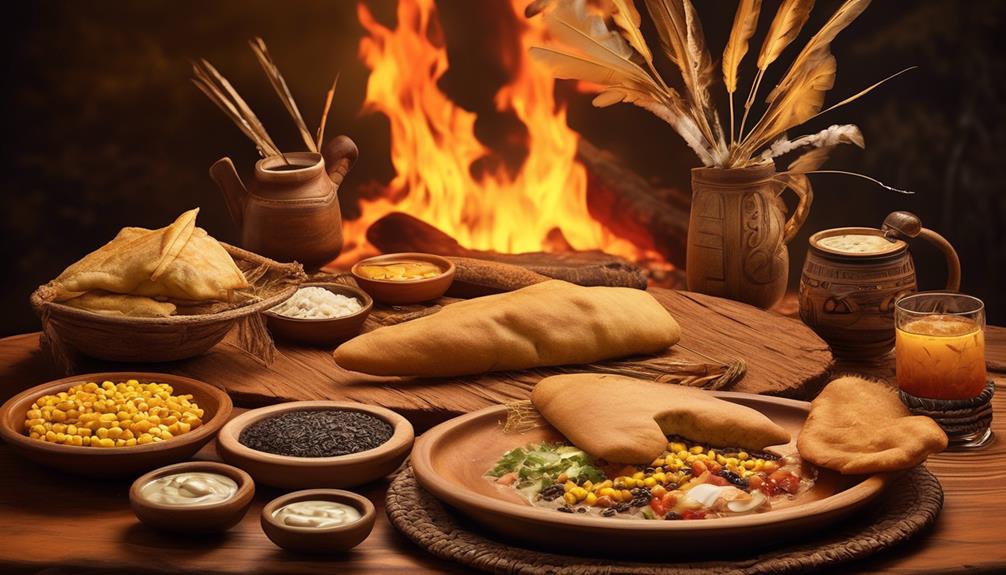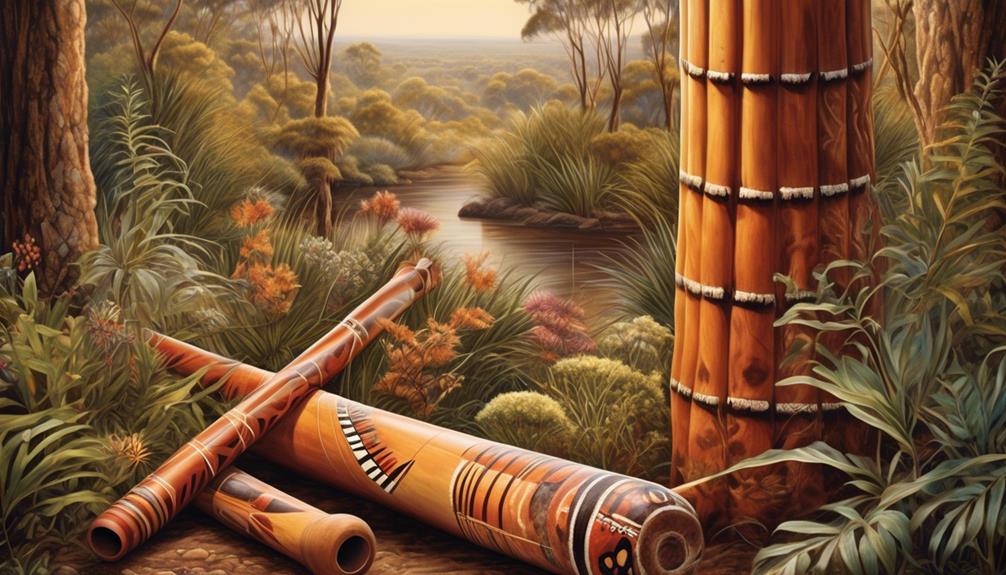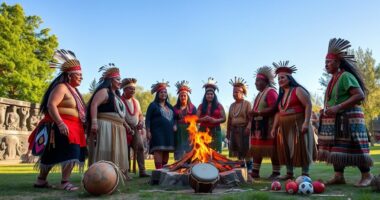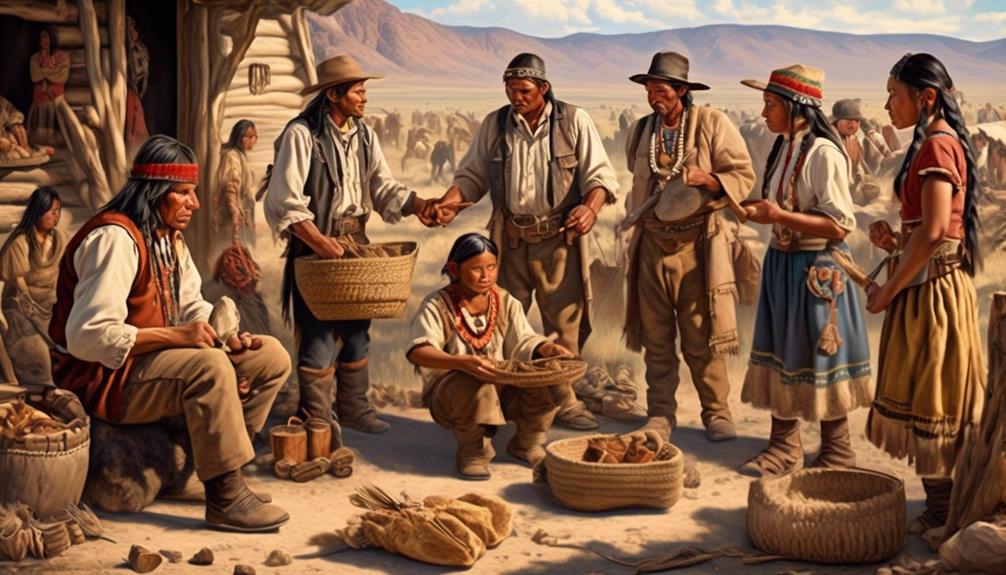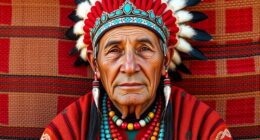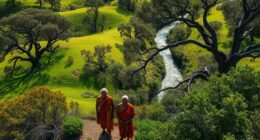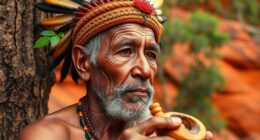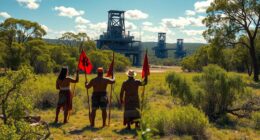Have you ever thought about how we can truly acknowledge and honor indigenous peoples on Thanksgiving?
It's a topic that often gets overlooked in the hustle and bustle of the holiday season. However, there are meaningful and impactful ways to recognize and celebrate the rich history and culture of indigenous communities.
By exploring these thoughtful gestures, we can foster a more inclusive and respectful Thanksgiving tradition for all.
Key Takeaways
- Challenging myths and understanding the history of Thanksgiving is crucial in acknowledging the reality of the past and honoring Indigenous voices.
- Respecting boundaries and acknowledging the traditional custodians of the land demonstrates an understanding of Indigenous peoples' deep connection to their land.
- Supporting Indigenous artists and entrepreneurs promotes economic empowerment and sustains traditional art forms and practices.
- Participating in Indigenous community events fosters a deeper respect and appreciation for their customs and traditions.
Understanding the History of Thanksgiving
Let's explore the history of Thanksgiving to gain a deeper understanding of its origins and significance. Exploring the origins of Thanksgiving reveals a complex and often challenging history. Contrary to popular myths, the 'First Thanksgiving' wasn't a harmonious gathering between Pilgrims and Native Americans. The traditional story overlooks the suffering and displacement of Indigenous peoples due to colonization. Challenging these myths is crucial in acknowledging the reality of the past and honoring Indigenous voices.
The history of Thanksgiving is intertwined with the experiences of Native American tribes who've their own traditions of harvest celebrations. Understanding the origins of this holiday involves recognizing the contributions and resilience of Indigenous communities. It's essential to approach this history with empathy and respect for the diverse perspectives involved.
Acknowledging Indigenous Land and Territories

The history of Thanksgiving intertwines with the experiences of Native American tribes, and as we honor this holiday, it's crucial to acknowledge and respect the Indigenous land and territories on which we gather. In doing so, we can show our commitment to understanding and honoring the rich history and culture of Indigenous peoples.
Here are three essential ways to acknowledge Indigenous land and territories:
- Respecting Boundaries: It's vital to recognize and respect the boundaries of Indigenous land. This means being mindful of where we're and understanding the significance of the specific territory we're on.
- Land Recognition: Acknowledging the traditional custodians of the land and paying respects to their ancestors demonstrates an understanding of the deep connection Indigenous peoples have to their land.
- Sovereignty Awareness: Recognizing Indigenous sovereignty and the rights of Indigenous peoples to govern their territories is crucial. It involves understanding the legal and political autonomy of Indigenous communities.
Supporting Indigenous Artists and Entrepreneurs
Supporting Indigenous artists and entrepreneurs is an integral part of honoring and uplifting the vibrant cultural contributions of Indigenous communities. By actively seeking out and investing in Indigenous representation, we can promote economic empowerment and help sustain traditional art forms and practices. When we support Indigenous artists and entrepreneurs, we are not only appreciating their creativity and talent but also contributing to the preservation of their cultural heritage.
| Indigenous Artists | Indigenous Entrepreneurs |
|---|---|
| Painters | Jewelry designers |
| Sculptors | Textile makers |
| Musicians | Pottery makers |
Indigenous artists and entrepreneurs often face barriers to accessing markets and resources, making it crucial for us to actively seek out their work and support their businesses. By doing so, we can help create opportunities for economic growth within Indigenous communities, while also celebrating and preserving their rich cultural traditions.
As we engage with Indigenous artists and entrepreneurs, let's prioritize building respectful and mutually beneficial relationships. This approach fosters an environment where their voices, stories, and contributions are valued and uplifted, contributing to a more inclusive and equitable society.
Participating in Indigenous Community Events
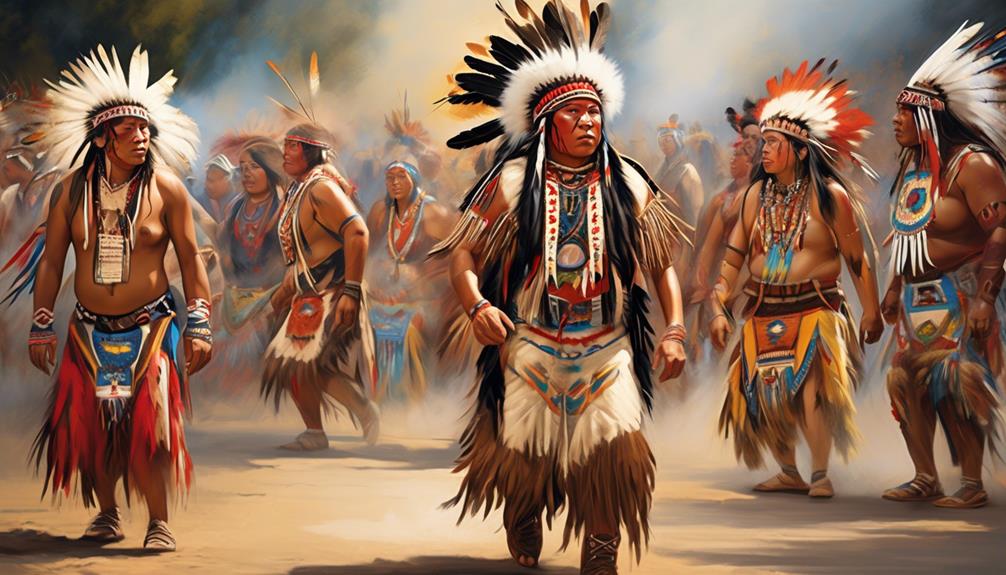
As we engage with the vibrant cultural contributions of Indigenous communities through supporting their artists and entrepreneurs, it's important to actively participate in Indigenous community events to further our understanding and appreciation of their traditions and heritage.
When connecting with indigenous traditions, it's essential to engage in community events to foster a deeper respect and appreciation for their customs. Here are three ways to actively participate in Indigenous community events:
- Attend Traditional Ceremonies: Participating in traditional ceremonies such as powwows, sweat lodges, or storytelling sessions provides an opportunity to witness indigenous customs firsthand and gain insight into their spiritual beliefs and practices.
- Volunteer at Community Gatherings: Volunteering at events like cultural festivals, language revitalization workshops, or community feasts is a meaningful way to show support and respect for indigenous communities while actively contributing to the success of the event.
- Engage in Cultural Workshops: Joining cultural workshops on traditional art forms, language, or crafts offers a hands-on experience to learn directly from indigenous community members, fostering a deeper understanding and connection to their heritage.
Educating Yourself and Others on Indigenous Issues
To understand the complex issues facing Indigenous communities, it's crucial to actively educate ourselves and others through respectful engagement and open dialogue. Cultural sensitivity is key when delving into Indigenous issues. It's essential to approach the learning process with an open mind and a willingness to listen and understand perspectives that may differ from our own. Historical context is also vital in understanding the challenges and triumphs of Indigenous peoples. Acknowledging the impact of colonization, forced assimilation, and ongoing systemic injustices is crucial in comprehending the current issues faced by Indigenous communities.
Educating ourselves and others on Indigenous issues involves seeking out diverse and reputable sources of information. It's important to engage with Indigenous voices and communities, as well as scholarly works and resources. Actively participating in discussions, workshops, and educational events focused on Indigenous issues can also deepen our understanding and awareness.
We must also recognize that our education is an ongoing process, and that we must continually strive to learn, unlearn, and relearn. By approaching this with humility, empathy, and a genuine commitment to growth, we can become better allies and advocates for Indigenous peoples.
Frequently Asked Questions
How Can I Support Indigenous Communities and Causes Beyond Thanksgiving?
We can support Indigenous empowerment and sustainable activism by building community partnerships and engaging in cultural education. It's crucial to listen to Indigenous voices, learn about their history, and amplify their causes year-round.
Engaging in sustainable activism means actively advocating for Indigenous rights and supporting initiatives that prioritize their well-being. By forming meaningful connections and advocating for change, we can make a positive impact and honor Indigenous communities beyond Thanksgiving.
What Are Some Common Misconceptions About Indigenous Peoples That I Should Be Aware Of?
Common stereotypes about indigenous peoples often paint them as a homogeneous group with outdated traditions. This overlooks the diversity and vibrancy of their cultures.
Additionally, cultural appropriation often trivializes sacred symbols and practices. It's vital to understand and respect the distinct customs of each indigenous community.
We should actively challenge these misconceptions, fostering genuine respect and appreciation for their heritage.
What Are Some Ways to Respectfully Engage With Indigenous Cultures and Traditions?
Engaging respectfully with indigenous cultures and traditions involves active listening, genuine curiosity, and cultural appreciation. It's about honoring their history, traditions, and knowledge.
We can show respect by seeking permission before participating in cultural activities, learning about the significance of traditional practices, and supporting indigenous communities. It's important to approach with humility, understanding that we're guests in their cultural space.
This fosters meaningful connections and promotes mutual understanding.
How Can I Incorporate Indigenous Perspectives Into My Everyday Life, Not Just on Thanksgiving?
Incorporating traditions and cultural education into our daily lives enriches our understanding of the world around us.
We can do this by actively seeking out indigenous perspectives in our media consumption, engaging in respectful dialogue with indigenous communities, and supporting indigenous-owned businesses.
Are There Any Specific Indigenous Organizations or Initiatives I Can Support in My Local Area?
In our local area, there are fantastic indigenous organizations and community initiatives that we can support. These groups play a vital role in preserving indigenous culture and advocating for indigenous rights.
Conclusion
As we gather to celebrate Thanksgiving, let's remember to honor and uplift indigenous peoples.
By acknowledging their land and territories, supporting their artists and entrepreneurs, and educating ourselves and others on indigenous issues, we can show our respect and gratitude.
Let's come together as a community to embrace the rich and diverse culture of indigenous peoples, and strive to create a more inclusive and empathetic society for all.
